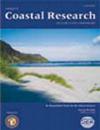Biological Flora of Coastal Salt Marshes: Iva frutescens L.
4区 地球科学
Q3 Earth and Planetary Sciences
引用次数: 0
Abstract
ABSTRACT Stalter, R. and Lonard, R.I., 2024. Biological flora of coastal salt marshes: Iva frutescens L. Journal of Coastal Research, 40(4), 809–815. Charlotte (North Carolina), ISSN 0749-0208. Iva frutescens L., also known as marsh elder, has a broad distributional range, from the Atlantic coast of Nova Scotia, Canada, to Florida in the United States and from Florida on the Gulf of Mexico to the central Texas coast. Iva frutescens typically occurs in the upper tidal ecotone of salt marshes with more terrestrial upland vegetation. Marsh elder is a hardy shrub that is relatively intolerant to flooding but has a relative tolerance to low soil salinity. Iva frutescens recovers quickly after cutting and fire and may be important in blocking the invasion of Phragmites australis into reconstructed salt marshes. Borrichia frutescens and I. frutescens are associated with the phenomenon of associational resistance. Gall-midge densities in marsh elder stems are reduced when I. frutescens occurs with a second gall-forming host, B. frutescens.沿海盐沼的生物植物区系:Iva frutescens L.
ABSTRACT Stalter, R. and Lonard, R.I., 2024.沿海盐沼的生物区系:海岸研究杂志》,40(4),809-815。Charlotte (North Carolina), ISSN 0749-0208.Iva frutescens L. 又名沼泽接骨木,分布范围很广,从加拿大新斯科舍省大西洋沿岸到美国佛罗里达州,从墨西哥湾的佛罗里达州到德克萨斯州中部海岸。沼泽接骨木(Iva frutescens)通常生长在盐沼与陆地高地植被之间的潮汐上游生态带。沼泽接骨木是一种耐寒灌木,相对不耐洪水,但对低土壤盐度有一定的耐受力。沼泽接骨木在砍伐和火灾后能迅速恢复,在阻止葭萌植物入侵重建的盐沼中可能很重要。Borrichia frutescens 和 Iva frutescens 与联合抵抗现象有关。当 I. frutescens 与第二个形成虫瘿的宿主 B. frutescens 共存时,沼泽接骨木茎中的瘿蚊密度会降低。
本文章由计算机程序翻译,如有差异,请以英文原文为准。
求助全文
约1分钟内获得全文
求助全文
来源期刊

Journal of Coastal Research
地学-地球科学综合
自引率
0.00%
发文量
87
审稿时长
3-8 weeks
期刊介绍:
The Journal of Coastal Research (JCR) is one of the leading international journals for coastal studies and processes, and is published bi-monthly by the Coastal Education & Research Foundation [CERF]. By covering the entire field of coastal research, the JCR encompasses all subjects relevant to natural and engineered environments (freshwater, brackish, or marine) and the protection/management of their resources in the vicinity of coastlines of the world. Even though the journal broadly focuses on immediate shoreline zones, the JCR also embraces those coastal environments that either reach some indefinite distance inland or that extend seaward beyond the outer margins of the sublittoral (neritic) zone. The JCR disseminates accurate information to both the public and research specialists around the world on all aspects of coastal issues in an effort to maintain or improve the quality of our planet''s shoreline resources.
 求助内容:
求助内容: 应助结果提醒方式:
应助结果提醒方式:


